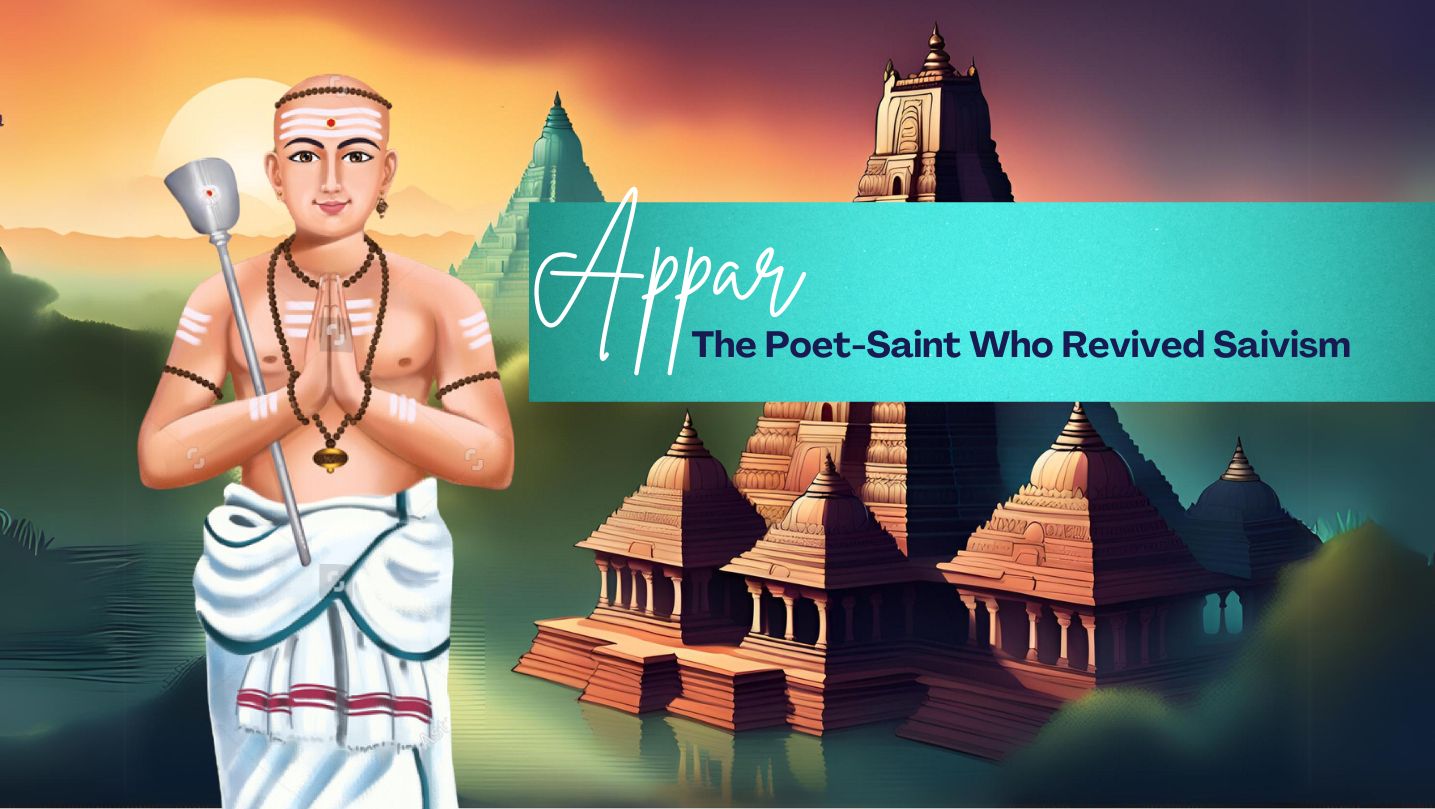
Thirunavukkarasar, also known as Appar, was a prominent seventh-century Saiva Tamil poet-saint and one of the revered sixty-three Nayanmars. Born with the name Marulneekkiyar, which means "dispeller of darkness or ignorance," he earned the name "Appar," meaning "father," from his younger contemporary, Sambandar. His profound and moving hymns earned him the title Tirunavukkarasar, or "Lord of Speech," and he is celebrated for his significant contributions to Tamil devotional literature.
Early Life and Conversion
Appar was born in the mid-7th century in Tiruvamur, Tamil Nadu. His sister, Thilagavathiar, faced tragedy when her fiancé, a military commander, died in battle. As she contemplated ending her life, her brother’s pleas led her to choose an ascetic life and care for her only sibling.
During his youth, Appar became deeply interested in Jainism, joining a Jain monastery in Pataliputra where he was named Dharmasena. However, after a period of severe illness and a series of divine interventions, he abandoned Jainism. His sister's fervent prayers and the grace of Lord Siva led to his reconversion to Saivism, marked by a miraculous healing and a deep spiritual transformation.
Persecution and Miracles
Appar's return to Saivism and his miraculous survival from severe colic angered the Jain monks, who conspired against him. They falsely accused him of treason, leading the king to order a series of punishments: being thrown into a lime kiln, poisoned, trampled by an elephant, and finally, cast into the sea tied to a stone. Each time, Appar's unwavering devotion to Lord Siva and his continuous chanting of the Panchakshara Mantra saved him. These divine interventions, including a miraculous transformation of the burning kiln into a cool haven and a stone floating on the sea, showcased his spiritual power and devotion.
Contributions and Later Life
After these ordeals, Appar continued to spread Saivism, traveling to numerous temples and composing hymns in praise of Lord Siva. His compositions, which total 4,900 hymns according to tradition, have been preserved in the Tirumurai, a revered collection of Saiva devotional literature. Alongside his contemporaries, Sundarar and Thirugnana Sambandar, Appar's hymns are integral to the Thevaram.
Appar played a crucial role in the revival of Saivism and the restoration of Shiva temples. He initiated the practice of temple cleaning, known as Uzhavarapadai, inspiring devotees to maintain the sanctity and cleanliness of these sacred spaces. His efforts not only revitalized smaller temples but also fostered a communal spirit of devotion and service.
Meeting with Thirugnana Sambandar and Final Journey
Appar's journey included a notable meeting with the young saint Thirugnana Sambandar, who addressed him with great respect as "Appar." Together, they visited numerous temples, spreading their devotional hymns and strengthening the Saiva tradition.
In his later years, Appar embarked on a pilgrimage to Mount Kailas. Enduring a grueling journey, he experienced a divine vision where Lord Siva instructed him to bathe in a tank, after which he perceived the sacred presence of Kailas at Tiruvayar. This vision reaffirmed his spiritual path, and he continued his devotion until his death at the age of 81, achieving Mukti, or union with Lord Siva.
Legacy
Appar's hymns were instrumental in transitioning from Vedic rituals to Agamic puja in Shiva temples, integrating and preserving the efficacy of Vedic traditions within the Agamic framework. His life and works remain a testament to his unwavering faith, resilience, and profound impact on Tamil devotional practices and Saivism.
 Dakshinamurthy is a scholar and researcher of Indic themes and a contributing writer of The Verandah Club
Dakshinamurthy is a scholar and researcher of Indic themes and a contributing writer of The Verandah Club
NEXT ARTICLE

Indian History is rife with conflict between kings for power, territory and regional supremacy. We have seen instances where kings have made it a poin...

"Saare Jahaan Se Accha, Hindustan Hamara!"These immortal words, spoken by Squadron Leader Rakesh Sharma from the vast expanse of space in 1984, When t...

High in the rugged, unforgiving terrain of Jammu and Kashmir’s Reasi district, where the Chenab River slices through deep gorges and the Himalayas loo...